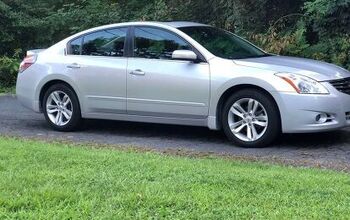Volt Birth Watch 126: Shock, Horror! Chevy Volt Uses Gas!
Forty miles without a single drop of gasoline. That’s been the pitch for Chevrolet’s Volt since it was just a concept. And it’s a claim that GM has been hammering hard on in promotional materials, advertisements and to the media. But it seems that the claim deserves an asterisk. Green Fuel Forecast‘s Sam Abuelsamid recently spoke with folks from GM’s Voltec battery development team. In the discussion of the Volt’s thermal management system, an inconvenient truth raises its misshapen head. “If you’re not plugged in and the battery is not conditioned and we’ve got to deal with the elements, right now we’re thinking 0-10°C we won’t use the battery. The more we can use it the better but we’ve got that area of refinement we’ll have to do as we get more of the engines, more of the vehicles, more of the batteries and tune it all up,” GM director of hybrid energy storage systems, Denise Gray tells GFF.
According to Abuelsamid, this means that “if the car is parked unplugged in cold weather and the driver starts it up, the range extender may start up immediately even if the battery has a high state of charge.” In other words, if it’s cold outside and you start your Volt without it being plugged in, GM’s marketing claim of “40 miles without a single drop of gas” claim is plain wrong.
Which is not to say that a quick warm-up using the range-extending gas engine will ruin your lean, mean carbon footprint. But like everything else with the Volt, it shows the fatal hubris of trying to design a car to the specifications of an already-existing marketing campaign.
More by Edward Niedermeyer

































Comments
Join the conversation
Author: joeaverage Comment: "Let's keep it real (even if GM isn't). An EV or even the Volt is going to be best suited for milder climates. I can't believe that GM isn't talking about the effect of sub-freezing weather on a battery car of any type. Hey folks we've got a great product coming but understand that 5F is going to seriously impact your car's efficiency." I'd be interested in extrapolated mileage figures for Volts in N.E./NY/N.J area over the winter time and if winter's the price you pay for the ICE spinning more often and say 10-20 mpg maximum less but still being significantly better than any ICE or Prius/Civic/Fusion. I mean, how bad can the degradation be and...when the winter kicks in, it's across the board for all vehicles, not just Volt? Educate me.
There is an EV design consulting company in Ottawa (where gets very cold) that did some cold weather testing on EV conversions a few years back, and found that properly conditioned EV battery packs could function in -17 degree Celsius (that's about 1.4 degrees Fahrenheit) with less than 8% range reduction. The tests were done with Environment Canada's fuel efficiency testing equipment and procedures, so it's a pretty good test. Two vehicles were tested, one with a 2 year old battery pack (both lead-acid), and they were left in -17 degree temperatures for 18 hours with just the pack warmer on before testing. http://www.revconsultants.com/winterizing.html The key was simple thermal management of the battery pack. With a properly heated pack, the main difference in range seemed to come down to the cold weather efficiency of the electric drivetrain and gearbox lubricants. The car with the more efficient drivetrain only experienced a 0.4% reduction in range, which is very impressive. EVs work just fine in cold climates, if they are designed properly for them, which the Volt is by all accounts. I agree that this is a non issue. It's only going to happen if the car has been left out in the cold, and not plugged-in. When left in the cold, the genset will run on startup to power the motor until the battery heaters bring the pack up to operating temperature. Then the genset will shut off and the pack will take over until it is dicharged. This makes perfect sense for battery preservation reasons. You still get your full EV range (dependant on conditions, accessories, driving style, etc...), just not right from startup. Those in milder climates will never experience this, nor will anyone in cold climates who routinely plug-in thier Volt whenever it's stationary. As a Canadian who suffers through some rough winters, I know my ICE car doesn't like the cold weather very much either. I am more than willing to accept this design compromise for a third or so of the year if it makes the Volt a reality.
"EVs work just fine in cold climates, if they are designed properly for them, which the Volt is by all accounts. I aggree that this is a non issue. It’s only an issue if the car has been left out in the cold, and not plugged-in. When left in the cold, the genset will run on startup to power the motor until the battery heaters bring the pack up to operating temperature. Then the genset will shut off and the pack will take over until it is dicharged. This makes perfect sense for battery preservation reasons. You still get your full EV range, just not right away. Those in milder climates will never experience this, nor will anyone in cold climates who routinely plug-in thier Volt whenever it’s stationary." -- kgurnsey (full text in comment just above) Thanks, kgurnsey, I'm convinced and I hope others are, too. I'm no fanboy GM apologist. Like so many American, fat cat bureaucracies, they have truly lost their way. Volt, either by accident, divine providence or some secretly-operating rogue pack of GM geniuses, is a winner which, while perhaps not turning around what to many is a huge "garbage scow" of a company...will certainly bring to the world a great and revolutionary form of middle America transportation: A fully electric-motor-driven-vehicle with two very economic ways of creating and storing electricity for its daily propulsion. I'm waiting in line for mine!